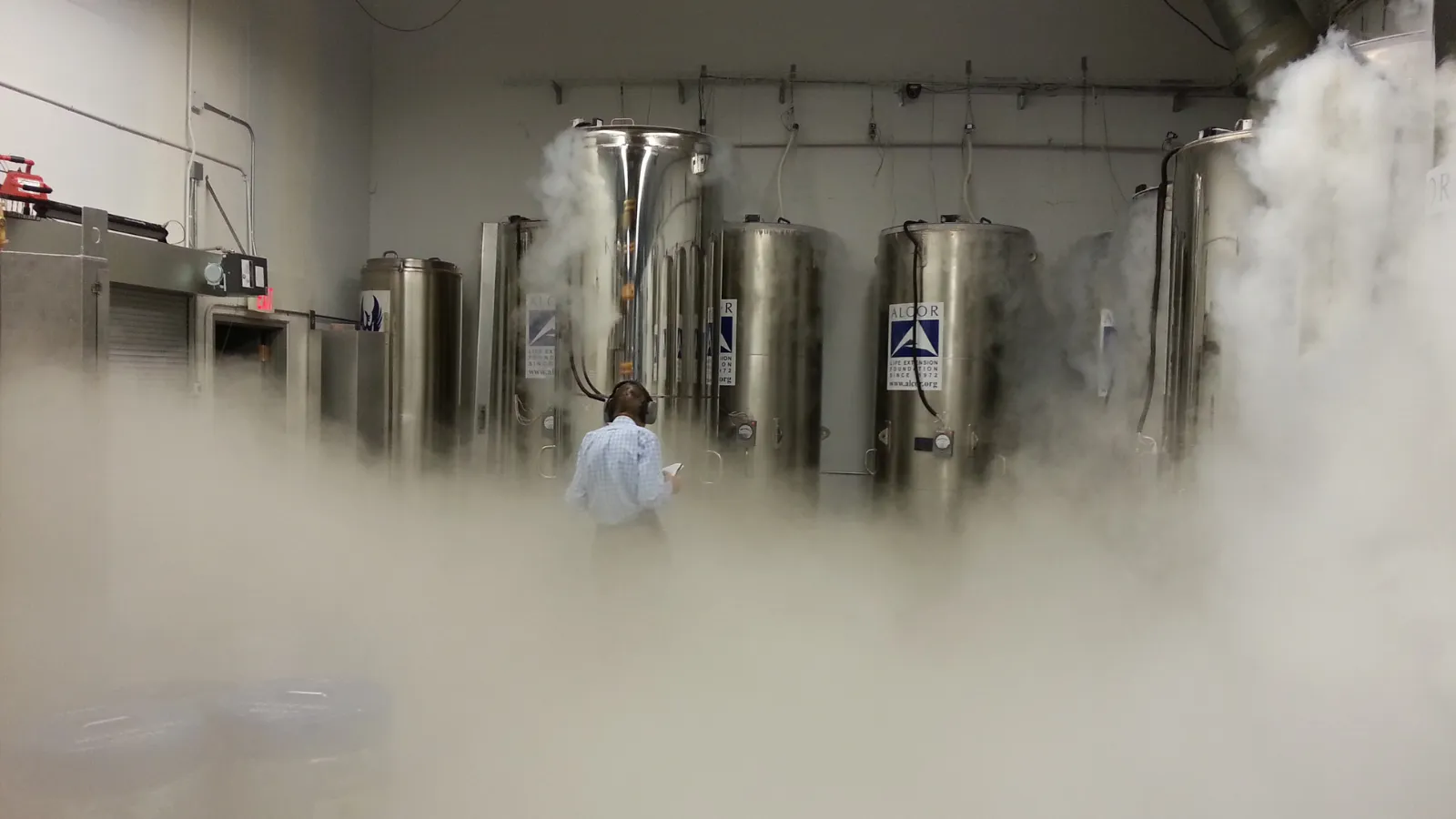News
Meet the Cryonics Company Preserving Bitcoin Legend Hal Finney’s Body
When computer scientist and Bitcoin pioneer Hal Finney died in 2014 from complications from ALS, his body was cryopreserved by the Scottsdale, Ariz.-based Alcor Life Extension Foundation . For many in the life extension and transhumanist community, the idea of cryopreserving one’s body offers the hope of a kind of immortality, with the possibility of being revived in the future when a cure for their cause of death is found.
Also known as cryo-freezing, the service has several practical applications, including preserving whole bodies, body parts, organs, and cells—as well as studying future resurrection.
“We're seeing what was a science fiction application of preserving people at the time of death or for long-distance space travel,” Alcor President and CEO James Arrowood told Decrypt . “We're seeing that it has a number of other applications to medicine, for instance, and all kinds of science.”
Arrowood noted that Finney is one of the persons believed to be Satoshi Nakamoto , the creator of Bitcoin, and said losing his brain would be be unfair to humanity.
“I think just on the cosmic sense, how unfair it all is to lose somebody like that and their brain,” he said.
✨ Exactly 11 years ago today, cypherpunk legend Hal Finney wrote his final post on the #Bitcoin forum
He left a lasting legacy ? pic.twitter.com/5Em7VCtYSI
— The Bitcoin Historian (@pete_rizzo_) August 9, 2024
Founded in 1972 by Fred and Linda Chamberlain, The Alcor Life Extension Foundation is a nonprofit organization that researches and develops cryonics technology. Cryonics refers to the practice of preserving individuals at extremely low temperatures after death, with the hope that future technology can revive them and cure their ailments.
The concept of cryonics is attributed to American physicist and U.S. Army officer Robert Ettinger , also known as the “father of cryonics.” Ettinger is the author of “The Prospect of Immortality,” “Man into Superman,” and “Youniverse.”
“Alcor started out as a crazy idea, a moonshot, or what we call an aspirational technology,” Arrowood said. “It's finally—with some complimentary [technology] that's come up in the last 20 years—having some time to really develop into a full-on science.”

As Arrowood explained, cryonic freezing preserves cells using extremely low temperatures—around -320°F (-196°C). The primary challenge in cryopreservation is preventing ice formation within the cells, as ice can cause damage that complicates the revival process.
“There is also research going into what's called intermediate temperature storage, which is much warmer, which may make it easier to revive or reverse the process,” Arrowood said. “That's around negative 80 [degrees]. The two common parlance terms would be dry ice temperature or liquid nitrogen temperature.”
The cost of whole body preservation, Arrowood noted, can be up to $220,000, but whole-life insurance may cover the cost if the company—in this case Alcor—is designated as one of the beneficiaries of the policy.
Arrowood also said that while Alcor does not hold any cryptocurrency because of the volatility of such digital assets, the non-profit does accept Bitcoin , as it did in the case of BTC donations from fans of Finney. But the company will convert it to fiat.
“I would have liked to have held on to some of the Bitcoin that we've received over the years because it would be worth a lot of money today,” Arrowood joked.
To Arrowood’s point, when Finney passed away on August 28, 2014, the price of a single Bitcoin was $510. As of August 9, 2024, a single Bitcoin is worth $60,349.
Skeptics have called cryonics pseudoscience and bogus science. In a column for Scientific America, noted Skeptic and co-founder of the Skeptics Society Michael Shermer compared cryonics to religion.
“I want to believe the cryonicists—really, I do,” Shermer wrote. “I gave up on religion in college, but I often slip back into my former evangelical fervor, now directed toward the wonders of science and nature. But this is precisely why I’m skeptical. It is too much like religion: it promises everything, delivers nothing (but hope), and is based almost entirely on faith in the future.”
Arrowood countered the notion of cryonics as pseudoscience, arguing that every science faced skepticism before gaining acceptance.
“Cryonics is just the long-term storage of human remains or organs, as opposed to the short term for transplant, where it's a six-hour, 10-hour window,” Arrowood said. “Cryonics is the notion that these cells can be preserved and revived after a longer term of cold storage.”
While some call cryonics pseudoscience, many high-profile individuals, including Finney , baseball Hall of Fame player Ted Williams, and futurist FM-2030 (born Fereidoun M. Esfandiary), have chosen this option. To date, Alcor claims 234 patients .
Arrowood acknowledged that not everyone who turns to Alcor dreams of being revived in the future. Many simply want to be part of a pioneering scientific journey.
“I think people come with the intention to participate or have a seat on the cruise ship,” Arrowood said. “They know it may never reach the destination, but they want to be part of the journey, and I think that's really an important thing for people to understand.”

